[cs_content][cs_element_section _id=”1″ ][cs_element_row _id=”2″ ][cs_element_column _id=”3″ ][cs_element_text _id=”4″ ][cs_element_button _id=”5″ ][/cs_element_column][/cs_element_row][/cs_element_section][cs_section parallax=”false” separator_top_type=”none” separator_top_height=”50px” separator_top_inset=”0px” separator_top_angle_point=”50″ separator_bottom_type=”none” separator_bottom_height=”50px” separator_bottom_inset=”0px” separator_bottom_angle_point=”50″ style=”margin: 0px;padding: 0px 0px 0;”][cs_row inner_container=”true” marginless_columns=”true” class=”cs-ta-center” style=”margin: 0px auto;padding: 0px;”][cs_column fade=”false” fade_animation=”in” fade_animation_offset=”45px” fade_duration=”750″ type=”1/1″ style=”padding: 0px 10px 30px;border-style: dotted;border-width: 1px;border-color: hsl(0, 0%, 0%);”][cs_text class=”cs-ta-center”]In this article, Growers Network discusses the power of perlite for commercial cannabis production.

Hey! Want to learn how to grow cannabis? Check out
Growers Network University
[/cs_text][/cs_column][/cs_row][/cs_section][cs_section parallax=”false” separator_top_type=”none” separator_top_height=”50px” separator_top_inset=”0px” separator_top_angle_point=”50″ separator_bottom_type=”none” separator_bottom_height=”50px” separator_bottom_inset=”0px” separator_bottom_angle_point=”50″ style=”margin: 0px;padding: 0px 0px 10px;”][cs_row inner_container=”true” marginless_columns=”false” bg_color=”hsla(0, 0%, 100%, 0)” style=”margin: 0px auto;padding: 0px;”][cs_column bg_color=”hsla(0, 0%, 100%, 0)” fade=”false” fade_animation=”in” fade_animation_offset=”45px” fade_duration=”750″ type=”1/1″ style=”padding: 0px;”][cs_text]
If you’re a cannabis grower, you probably already know the advantages of using perlite in your media. This natural mineral has been getting extra attention lately as legal cannabis grow operations pop up all over the world. It’s water retention and draining benefits were even highlighted in the July 2019 issue of High Times. But what is perlite exactly and how does it benefit plants? Well, we’re here to get you up to speed on this mineral and even if you already know about perlite, I’m sure we’ll be able to let you in on a few things you may not have known.
What is Perlite?
Perlite is a natural occurring volcanic mineral that looks similar to Styrofoam. After it’s mined, perlite ore is sent for refining and expansion. Some perlite brands have different partners for each of these steps, while companies like Dicalite are vertically integrated and control all aspects of the process from mining to distribution to quality control of their Dicaperl brand (Psst – Dicaperl even offers free samples. Click the banner below to get yours).

Whether vertically integrated or outsourced, the refining process is where perlite grows into its true potential as heat from the process converts water molecules in the perlite to steam, causing it to expand, similar to popcorn. Perlite’s expanded form has unique characteristics that make it a superb addition to any organic grow medium as the porous nature of perlite allows for not only maximum drainability and water retention to maximize your nutrient efficiency, but it creates pockets that allow air to penetrate the root zone.
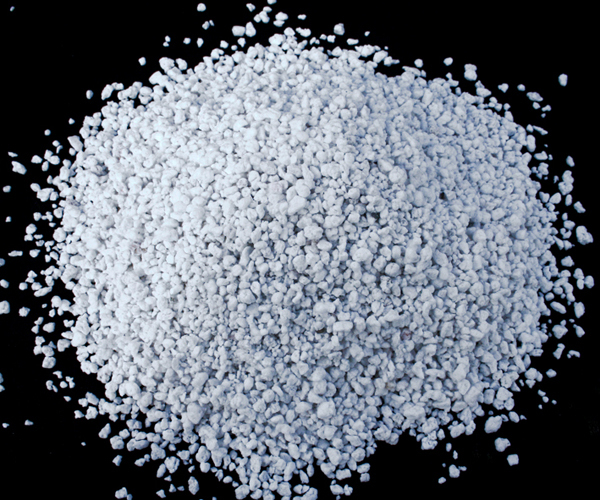
A closer look at perlite
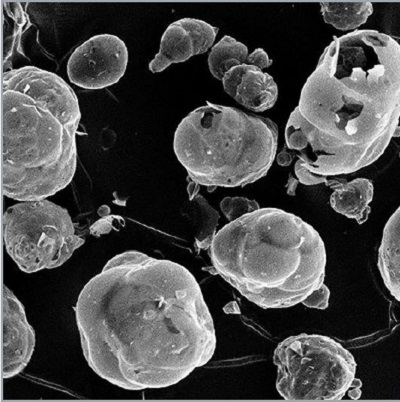
As mentioned above, refining causes perlite to expand, and in the process, the evaporated water leaves bubble-like air pockets. Depending on the grade of your perlite, it can be used for challenges faced in arid and humid climates. Where water retention is crucial, finer grade perlite will allow media to hold water longer. On the flip-side, coarse grade perlite allows for maximum drainability when humidity is higher. These characteristics, coupled with the root zone benefits, make perlite a powerful mineral additive no matter what the climate of the grow operation.
Benefits of Perlite over other soil media options
While every media type has its pros and cons, perlite offers some unique benefits not found in other media types.
1. Coco Coir
Sourced from the the interior of coconut shells, Coco Coir is a popular with hydroponic growers and has good water retention, deters some pests, and can be recycled.
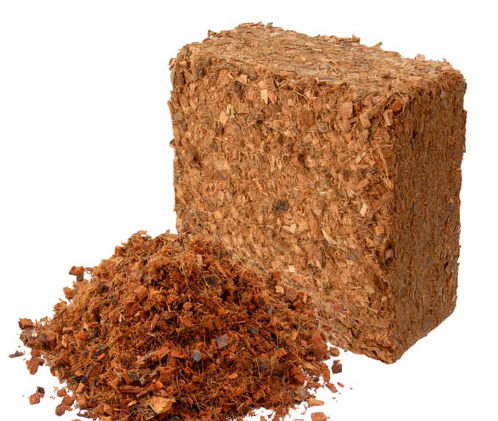
Drawbacks to Coco Coir:
- Non-neutral pH
- Can come in pre-charged with salts
- High potassium content can inhibit calcium absorption by roots
- Lower drainability can lead to over watering
2. Rockwool
Rockwool is made from melted basalt and chalk which are then spun to fine fibers and compressed into slabs or cubes. Rockwool is another media option popular with hydroponic growers and is both chemically and biologically inert.
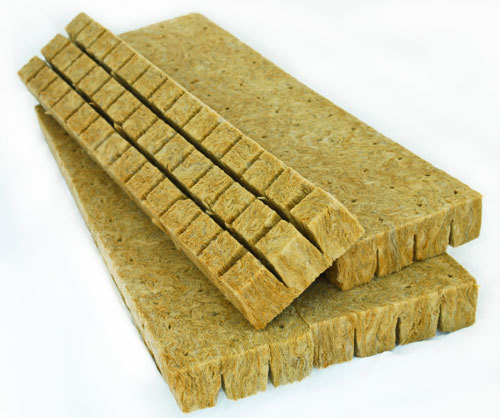
Drawbacks to Rockwool
- Non-Neutral pH
- Prone to over watering relative to other media types
3. Wood Fiber
Would fiber is manufactured by putting waste wood or virgin wood through a screw press that converts the wood to a form resembling cotton. The result is a material that wicks fairly well and captures water better than peat alone.
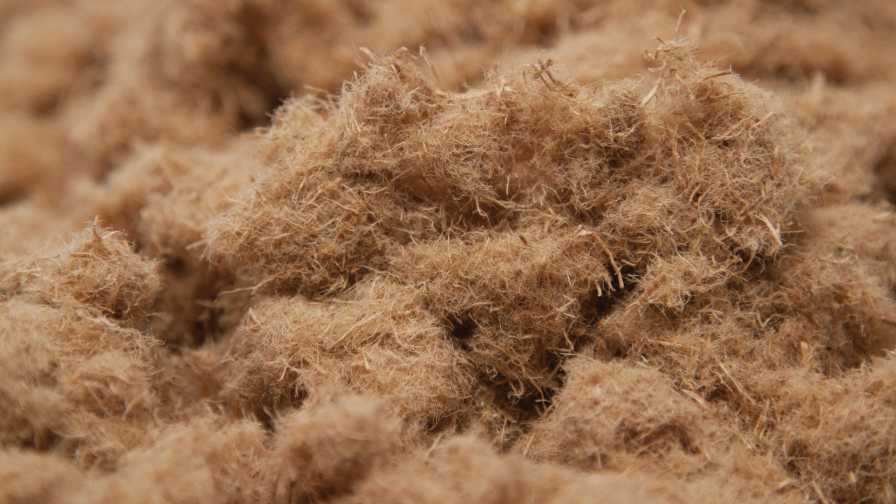
Drawbacks to Wood Fiber
- High natural pH requires frequent testing and adjustment.
- Uneven drying between exposed Wood Fiber and that deeper in the soil can result in over watering.
While these other products have their uses, perlite has the advantage of both drainability and water retention depending on the grade. Additionally, it’s pH neutral, dries evenly, and it won’t hinder absorption of vital nutrients.
Things to Consider when choosing perlite
Grade
The grade of perlite you choose depends on your growing needs. Again, large, coarse grade perlite is known for its advanced drainability, while fine grade perlite is useful for retaining water. What are you looking for from your perlite? Make sure you can answer that question and then choose your preferred grade accordingly.
Quality
Though perlite is a natural occurring mineral, there can be major disperity in the quality of perlite depending on the manufacturer. For example, if you are a grower interested in the drainability of perlite, you’d be smart going with the coarsest, largest grade, right? Wrong! Of course you want the right size, but large perlites can be easily damaged in transit so when you open up the bag, you’ll find that your coarse perlite has been banged around, and as a result, your bag is full of smaller grade perlite than you were expecting or even dust! As mentioned previously, Dicaperl is a perlite product from Dicalite Management Groups, an international, multi-mineral manufacturer that mines, refines, and commercially markets agricultural and horticultural perlite, diatomaceous earth, and vermiculite products. While all perlite ore mines are unique, their perlite mine is believed to be the deepest known commercial perlite ore deposit in North America. Because of their vertical integration, all aspects of production are controlled, from mining to expansion, enabling a greater degree of quality control while offering a more consistent perlite product and cost savings to the customer.
Supplier
Choosing a perlite supplier is a major decision for any grower, commercial or small scale. Here are a few things to consider:
- Avoid a manufacturer that doesn’t understand the needs and appropriate perlite grades.
- Ask for a free sample so you can see the results for yourself before committing to buy. Any company that stands behind its product should offer this as a way to create a long term relationship with their customers.
- Find out where the product is mined, refined, and expanded. These factors can impact price and delivery time.
- When deciding on a perlite supplier, make sure to ask questions and find out if their team has the perlite expertise you expect.

So there you have it! Are you using perlite? Did you take advantage of the free perlite sample? Let us know in the comments below, or better yet, click on one of the “Join Now” buttons above or below and become a member of our cannabis community. See you there![/cs_text][x_line style=”border-top-width: 1px;”][/cs_column][/cs_row][/cs_section][cs_element_section _id=”25″ ][cs_element_row _id=”26″ ][cs_element_column _id=”27″ ][cs_element_text _id=”28″ ][cs_element_button _id=”29″ ][/cs_element_column][/cs_element_row][/cs_element_section][cs_section parallax=”false” separator_top_type=”none” separator_top_height=”50px” separator_top_inset=”0px” separator_top_angle_point=”50″ separator_bottom_type=”none” separator_bottom_height=”50px” separator_bottom_inset=”0px” separator_bottom_angle_point=”50″ style=”margin: 0px;padding: 0px;”][cs_row inner_container=”false” marginless_columns=”false” style=”margin: 0px auto;padding: 0px;”][cs_column fade=”false” fade_animation=”in” fade_animation_offset=”45px” fade_duration=”750″ type=”1/1″ style=”padding: 0px;”][x_line style=”border-top-width: 1px;”][x_recent_posts count=”4″ offset=”” category=”” orientation=”horizontal” no_sticky=”true” no_image=”false” fade=”false”][x_line style=”border-top-width: 1px;”][x_feature_box title=”” title_color=”hsl(0, 0%, 0%)” text_color=”hsl(0, 0%, 0%)” graphic=”image” graphic_size=”40px” graphic_shape=”circle” graphic_color=”hsl(0, 0%, 0%)” graphic_bg_color=”hsl(0, 0%, 0%)” align_h=”center” align_v=”top” side_graphic_spacing=”20px” max_width=”none” graphic_image=”https://growersnetwork.org/wp-content/uploads/2018/12/email-4096-black-1.png” graphic_image_alt_text=”” graphic_animation=”rubberBand” graphic_animation_offset=”50″ graphic_animation_delay=”0″ style=”color: hsl(0, 0%, 0%);”]Do you want to receive the next Grower’s Spotlight as soon as it’s available? Sign up below![/x_feature_box][x_raw_content]
[/x_raw_content][x_line style=”border-top-width: 1px;”][x_feature_box title=”Do you have any questions or comments?” title_color=”” text_color=”” graphic=”image” graphic_size=”40px” graphic_shape=”square” graphic_color=”#ffffff” graphic_bg_color=”#2ecc71″ align_h=”center” align_v=”top” side_graphic_spacing=”20px” max_width=”none” link_text=”Feel free to post below!” href=”#dsq-app1″ href_title=”” href_target=”” link_color=”” graphic_image=”https://growersnetwork.org/wp-content/uploads/2018/12/Speech_Bubbles-512-1.png” graphic_image_alt_text=””][/x_feature_box][x_line style=”border-top-width: 1px;”][x_feature_box title=”About the Author” title_color=”” text_color=”” graphic=”image” graphic_size=”150px” graphic_shape=”circle” graphic_color=”#ffffff” graphic_bg_color=”#2ecc71″ align_h=”center” align_v=”top” side_graphic_spacing=”20px” max_width=”none” graphic_border=”border-width: 1px 1px 1px 1px; border-style: dashed; border-color: hsl(0, 0%, 0%);” graphic_image=”” graphic_image_alt_text=””][/x_feature_box][x_line style=”border-top-width: 1px;”]
[/cs_column][/cs_row][/cs_section][/cs_content]